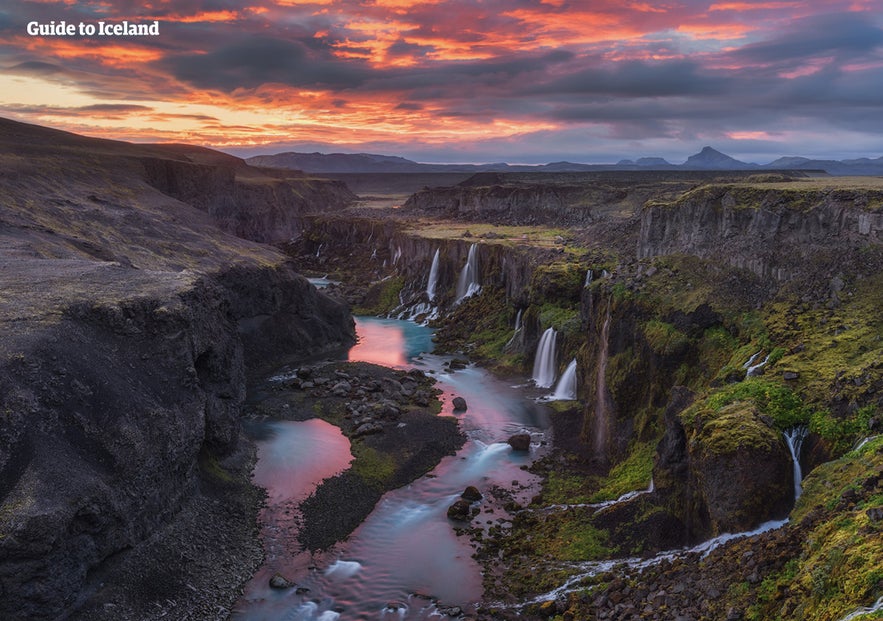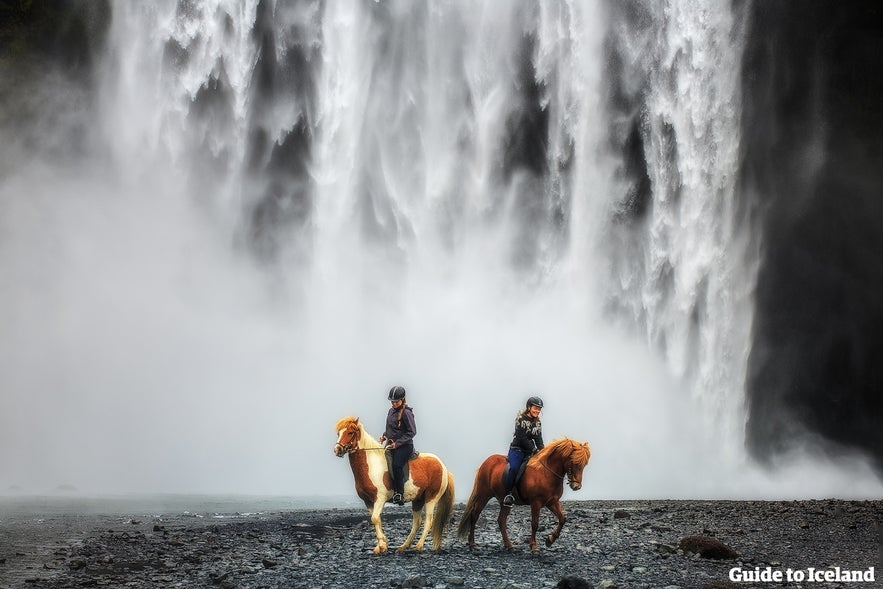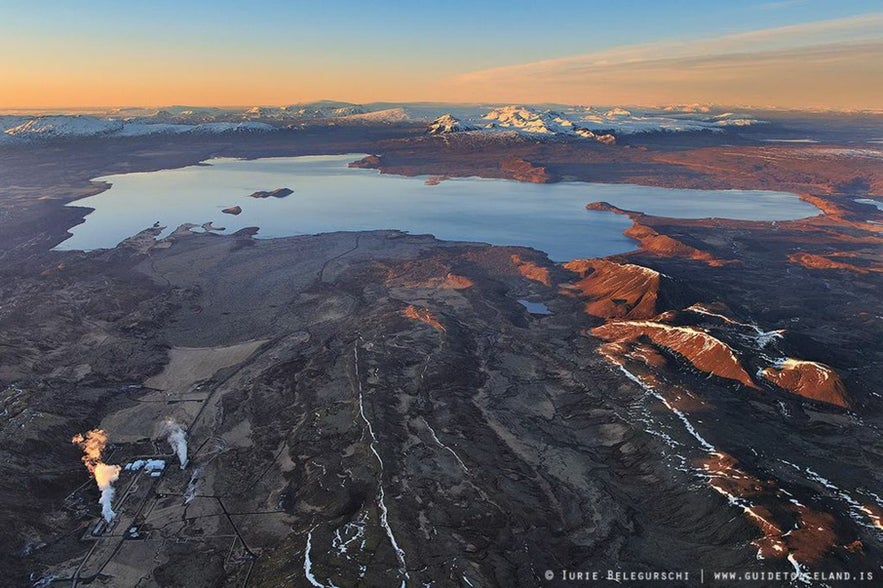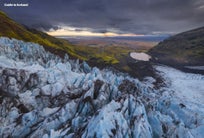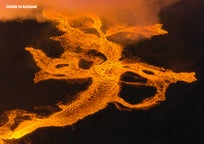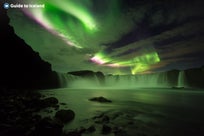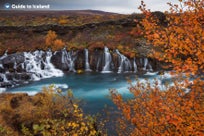
Top Activities in Iceland for Adrenaline Junkies
- Thrilling Activities on the Ice in Iceland
- Snowmobiling in Iceland
- Ice Climbing and Glacier Hiking in Iceland
- Ice Caving in Iceland
- Dog Sledding in Iceland
- Thrilling Activities in the Water in Iceland
- Scuba Diving in Iceland
- Snorkeling in Iceland
- River Rafting in Iceland
- Canoeing & Kayaking in Iceland
- Fishing in Iceland
- Surfing in Iceland
- Thrilling Activities on the Land in Iceland
- ATV or Buggy Riding in Iceland
- Mountain biking in Iceland
- Hiking and Trekking in Iceland
- Horse Back Riding in Iceland
- Volcano Tours in Iceland
- Thrilling Activities in the Air Above Iceland
- Heli-skiing and Heli-snowboarding in Iceland
- Helicopter Rides in Iceland
- Paragliding & Skydiving in Iceland
What extreme sports are available in Iceland, and how do adrenaline junkies here get their fix? Read on to find out everything you ever wanted to know about The Top Activities in Iceland for Adrenaline Junkies.
- Discover the stunning north with this scenic 5 day minibus tour of North Iceland
- Reach the peak with this Westfjords Hiking Adventure | Trek Between Two Fjords
- Looking for the ultimate adventure? See no further than exciting Adventure tours!
Iceland is a country of polar extremes and opposites. Iceland has a large landmass (103,000 km²) and a minuscule population (334,252 people). It is situated in the North Atlantic Ocean, neighboring Greenland to its west and mainland Europe to its east, and sits upon an active volcanic fissure called “The Icelandic Plume,” smack bang in the middle of the North American and European continental divides.
Known as the “Land of Ice and Fire,” Iceland is just as known for its creeping glaciers, dazzling ice caves, and frostbitten winters as it is for steaming fumaroles, warm and relaxing natural pools, and for its actively bubbling volcanoes. In the summer, guests and locals alike are privy to the Midnight Sun, whilst the winter sees an eternal night, forever holding the promise of Northern Lights dancing above.
All of these elements combined make for a great sporting location, open to all skill levels and gradients of experience. This means that regardless of whether or not you have one day or five to fill with action-packed adventure, you’re bound to find something that is to your liking, whether that be a spot of horse riding, ATV riding, river rafting, or something entirely new to you.
We here at Guide to Iceland have compiled our list of the top adrenaline-fueled activities in the country. Some are more demanding than others and do require prior experience, whilst others are open to experts and beginners alike. Even small children are invited to many of the adventures, which means that parents need not miss out on finding action-packed activities while traveling in Iceland.
- See also: Iceland With Kids | A Family Guide
Thrilling Activities on the Ice in Iceland
Some first-time visitors to Iceland might worry that by partaking in an adventurous activity, they might miss out on some of the more staple attractions available.
Fear not, as Iceland’s most popular sightseeing routes, such as the Golden Circle, have a number of tour choices that readily include physical activity, such as snorkeling at Silfra Fissure, Thingvellir, or snowmobiling on the country’s second-largest glacier, Langjokull.
Snowmobiling in Iceland
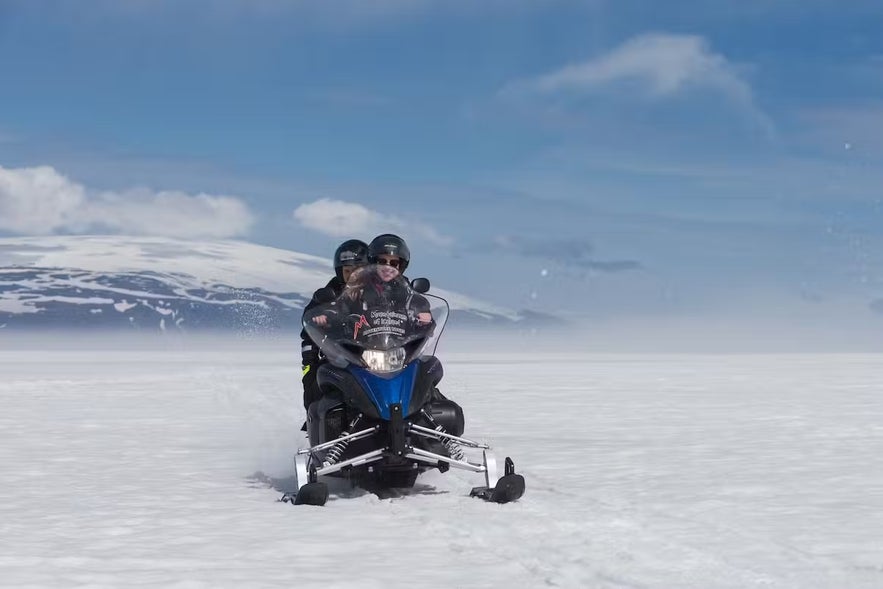 Photo from Snowmobile Tour on Langjokull Glacier with Transfer from Gullfoss Waterfall
Photo from Snowmobile Tour on Langjokull Glacier with Transfer from Gullfoss Waterfall
Everyone over the age of 6 has access to the snowmobiles as a passenger, but you must be 18 or over and hold a full international driver’s license if you wish to operate one.
Don’t worry too much if you’ve never been on a snowmobile before, as your experienced and knowledgeable guide will take you through the process step by step, as well as provide you with all necessary safety equipment, including helmets, gloves, and overalls.
Snowmobiles are very easy to maneuver, allowing you to cross snowy landscapes and glaciers in a fast and adrenaline-pumping way. Most snowmobiling tours in Iceland operate on top of glaciers, so in addition to the action on the snowmobile, you'll also have stunning views over the surrounding area.
Ice Climbing and Glacier Hiking in Iceland
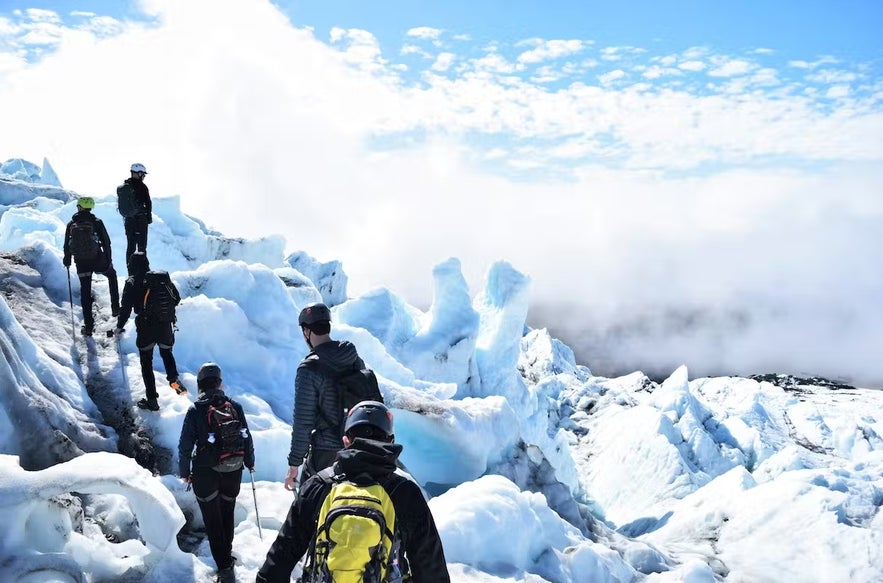 Photo from South Coast Minibus Tour with Glacier Hike & Transfer from Reykjavik
Photo from South Coast Minibus Tour with Glacier Hike & Transfer from Reykjavik
Ice climbing and glacier hiking take the basics of both activities and bring them to entirely new heights with incredible, creaking glacial landscapes, dark crevasses, towering frozen walls and intricate ice sculptures.
- See also: Glacier Hiking in Iceland
Children as young as 10 are permitted to climb the glacier, but guests must be 14 and over in order to participate in the ice-climbing segment of the tour.
Exploring the glaciers independently is strictly prohibited in Iceland because of the inherent dangers associated with such an activity. Certified guides mean that you receive information on the glacier, and all necessary equipment (including helmets, crampons, and ice poles) and provide a safe passage to your destination.
Ice Caving in Iceland
 Ice caving may not be too physically demanding, but it is an incredibly exciting and other-worldly activity. Ice caves generally form in Iceland at the beginning of the winter, meaning that glacier operators spend the warmer months searching for and exploring new caves for the upcoming season.
Ice caving may not be too physically demanding, but it is an incredibly exciting and other-worldly activity. Ice caves generally form in Iceland at the beginning of the winter, meaning that glacier operators spend the warmer months searching for and exploring new caves for the upcoming season.
Ice caves are famed for their dazzling blue interiors, their wealth of intricate ice sculptures, and amazing photographic opportunities. You will be provided with all of the necessary gear, including helmets and crampons, and will be given a short lesson on how to walk on the ice before entering the cave.
Glacier caves also have their fair share of danger, as they fill with water when the temperature is above freezing. They are, therefore, usually only accessible during the peak of winter, between mid-October to November and March. In all cases, they're only accessible with a guide who knows the ice cave well. This is to ensure the full safety of all visitors.
If this is on your bucket list, the most incredible ice-caving experience of this winter is the Western and Eastern Ice Caves. They are only accessible with this exclusive ice-cave tour in the Vatnajokull glacier.
Both the Western and Eastern Ice Caves are equally amazing, each offering a unique and unforgettable experience. The Western Ice Cave enchants with its vivid blue walls that sparkle like crystal, while the Eastern Ice Cave impresses with its larger size and striking formations.
Your journey begins with an exciting monster truck ride across the glacier, leading you to one of these incredible natural wonders. Depending on the day’s conditions, you'll be transported to the best cave available, ensuring a magical ice-caving adventure you won’t forget!
If you're visiting Iceland outside of winter and don't want to miss out, you can go to the ice tunnel in the Langjokull glacier. This man-made location is available year-round.
Dog Sledding in Iceland
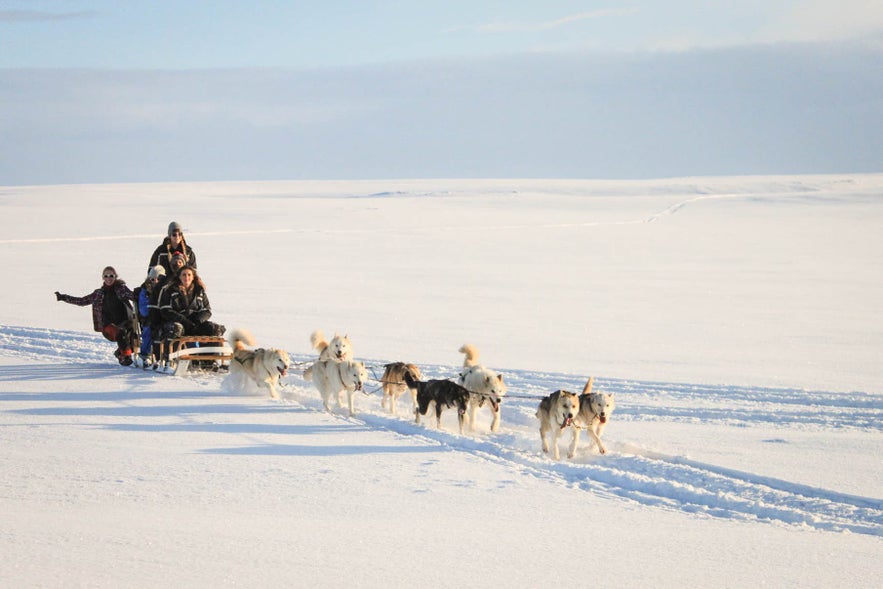 Photo from Meet on Location 45-Minute Dog Sledding Tour Near Reykjavik
Photo from Meet on Location 45-Minute Dog Sledding Tour Near Reykjavik
Dog sledding can be done year-round, although you will only go dog sledding on a glacier during the summertime.
In winter, the weather on the glaciers can be too harsh, so the dogs are kept on the South Coast of Iceland, where the weather is milder, so there's actually no guarantee that you will go dog sledding on snow during wintertime—but it's guaranteed during summer!
Dog sledding is a fun activity for all ages, and kids as young as 2 years old can go on the dog sleds. You also get plenty of time to fuss over the cute and fun dogs, amidst traveling in a beautiful landscape in style.
Thrilling Activities in the Water in Iceland
Scuba Diving in Iceland
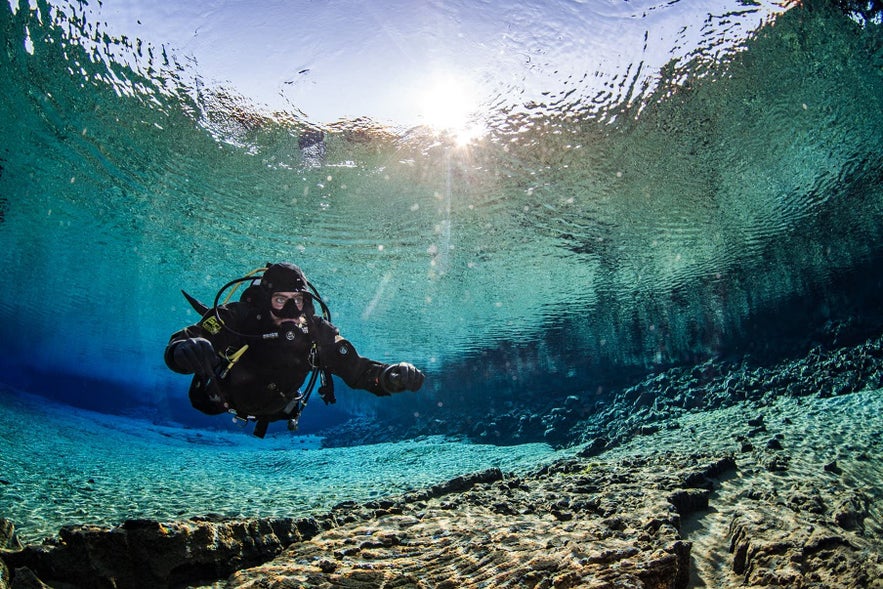 Photo from Guided 1 Hour Drysuit Diving Tour in Silfra with Hot Drinks with Transfer from Reykjavik
Photo from Guided 1 Hour Drysuit Diving Tour in Silfra with Hot Drinks with Transfer from Reykjavik
In Iceland, certified open-water divers with dry suit experience are qualified to dive in one of the world’s top dive sites, Silfra Fissure.
- See also: Scuba Diving and Snorkeling in Iceland
The dive site is situated in Iceland’s only UNESCO World Heritage site, Thingvellir National Park, and has water that's so clear the visibility can exceed 328 feet (100 meters). The temperature of the water stays cold all year round, between 39° and 25°F (2° and -4°C), but it never freezes thanks to a gentle underlying current in the fissure.
To make it even more remarkable, you'll be diving directly between the North American and the Eurasian tectonic plates, making it one of the rarest and most memorable diving experiences available in the world. Although Silfra is the most popular diving spot in Iceland, you can also choose to dive in the North Atlantic Sea or in a geothermal hot spring.
Snorkeling in Iceland
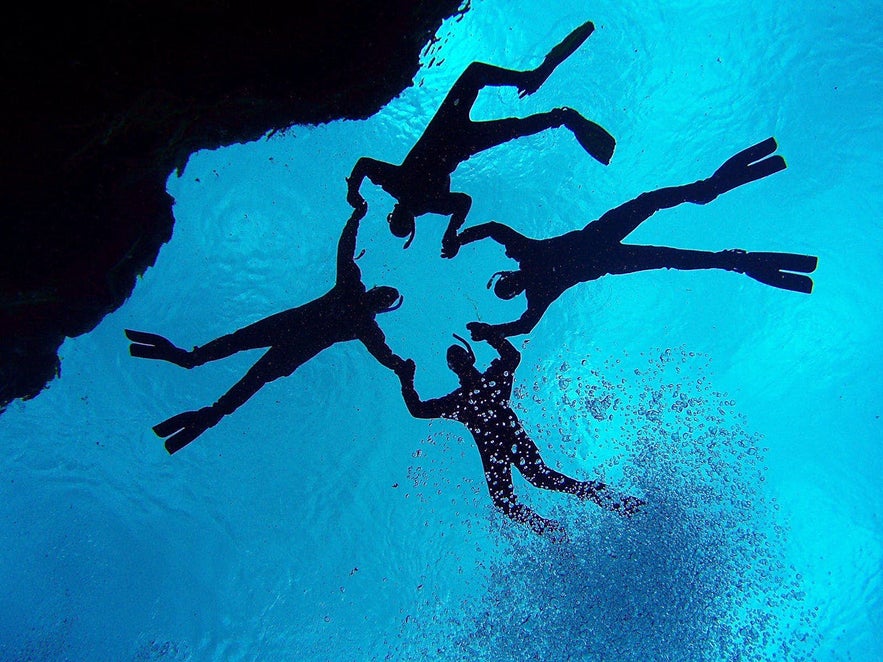 Photo from 3 in 1 Bundled Discount Activity Tours with Volcano Exploration, Snorkeling & Glacier Hiking
Photo from 3 in 1 Bundled Discount Activity Tours with Volcano Exploration, Snorkeling & Glacier Hiking
Those who do not have a scuba diving qualification can still experience the dazzling blue majesty of Silfra Fissure with a dry-suit snorkeling tour.
Unlike scuba diving, the only breathing apparatus you need to worry about is the plastic tube in your mouth. You will also be provided fins, neoprene hoods and gloves, a dry suit, and a mask.
Unlike scuba diving, wearing a dry suit whilst snorkeling will keep you buoyant at the surface, meaning there is no chance you’ll sink. Instead, you’ll feel as though you are flying over a sweeping canyon.
In both the snorkeling and scuba diving tours, you will experience all sections of Silfra Fissure, including the mesmerizing and dramatic Silfra cathedral, and the “Real Blue Lagoon”, an area of charming sandy shallows.
River Rafting in Iceland
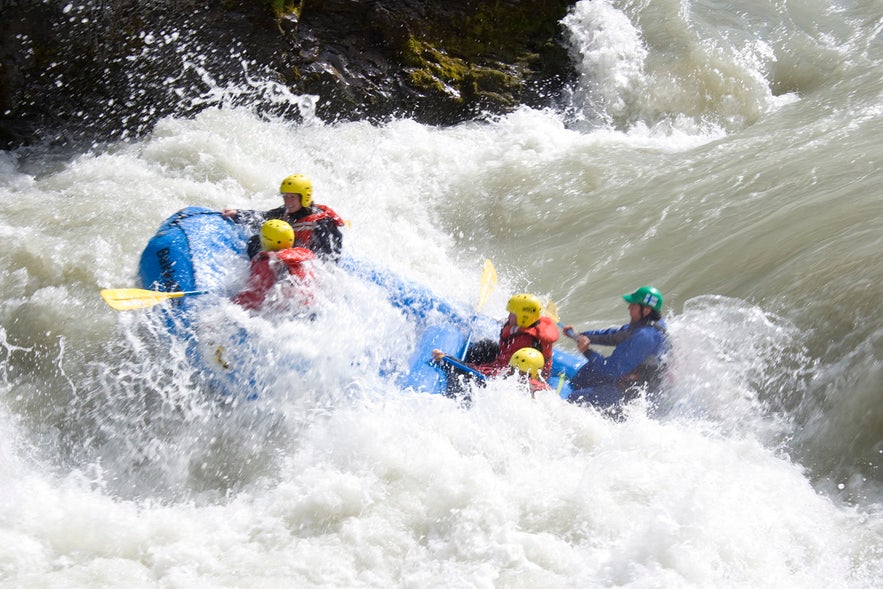
River Rafting in Iceland is a favorite among the local population and has risen in popularity since the 1980s. While Iceland lacks dramatic rivers such as those found in Nepal or Mainland Europe, they are still tumultuous enough to provide a challenge to even the most experienced river rafters.
Iceland boasts both easy rivers (classified as Grade 2) to more demanding rivers (Grade 4+), meaning you can choose the river that best fits your level of experience.
It is possible to try your hand at rafting on the Hvita river, found in the south, and two rivers up north, Jokulsá Austari (East Glacial River) and the Vestari Jokulsa (West Glacial River).
Most of the river rafting tours are available from May/June until September.
Canoeing & Kayaking in Iceland
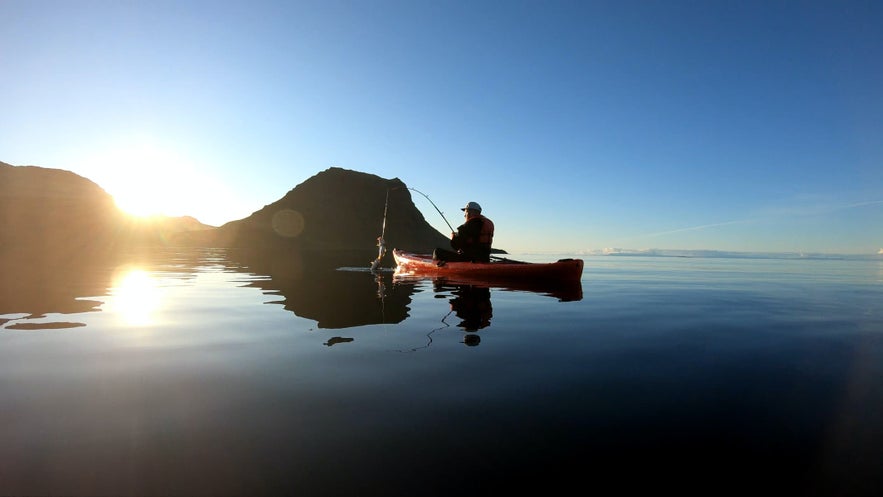 Photo from Relaxing 2 Hour Kayak Fishing Adventure by Mt. Kirkjufell
Photo from Relaxing 2 Hour Kayak Fishing Adventure by Mt. Kirkjufell
The gentle pastime of canoeing/kayaking is also available on Hvita, making for a fantastic, blended afternoon of sightseeing, physical activity and, undoubtedly, getting a little wet.
Canoeing and kayaking are also available on other rivers and patches of coastline in Iceland.
Many choose to go canoeing instead of river rafting in order to ensure smaller group sizes and a more personalized experience. Some people also want to avoid the more difficult sections of river rapids.
The minimum age for canoeing is 18, and two people can go in one canoe, meaning a more relaxed boat ride with less heavy physical work.
Fishing in Iceland
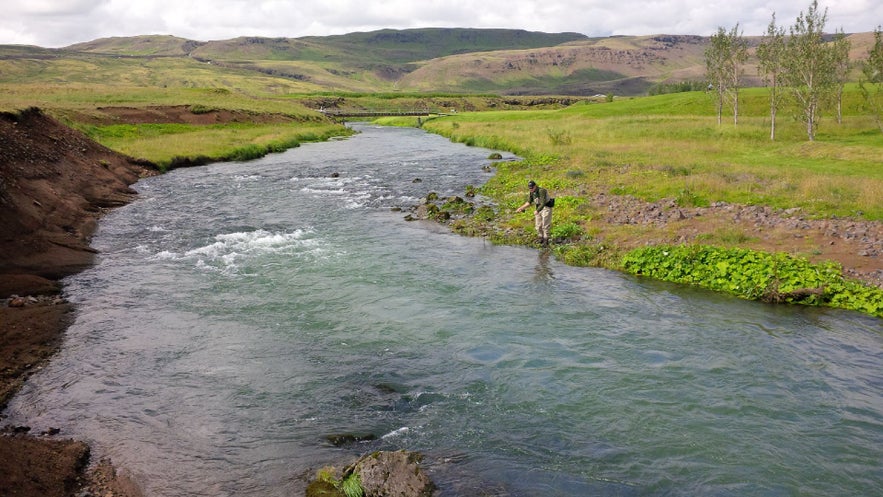
This is a definite favorite among Icelanders, a nation whose history and culture have been built on fishing for over 1000 years. Let's put it this way: if an Icelander can't help you to catch a fish, no one can.
- See also: Fishing in Iceland
Fishing has always been a big part of the Icelandic culture, so it's no surprise that you can choose from a number of fishing tours, available from April until September. The most common types of fish to catch in Iceland are Arctic Char, Salmon, and Brown Trout. It is possible to fish in Iceland's lakes, river systems (granted you have permission from the landowner), and the ocean.
Be aware that all fishing gear being brought into Iceland must be sanitized beforehand. This can be done for a small fee at Keflavik International Airport.
Surfing in Iceland
Surfing in Iceland is not only for hardcore surfers but for anyone looking for something a little different during their stay. Although the waves can be big and the sea is ice cold, surfing here presents some unique benefits, such as incredible surroundings, endurance training and some fantastic surf breaks.
- See also: Surfing in Iceland
Without a doubt, the best time to go surfing in Iceland is between October and March, when most of the country is battered by rain, storms, and strong winds. Of course, strong winds mean strong waves along the coastlines, thus a better and more challenging experience.
The majority of surfing in Iceland is done off the moon-like landscapes of the Reykjanes Peninsula, home to such attractions as Lake Kleifarvatn and the Bridge Between the Continents.
Thrilling Activities on the Land in Iceland
If you're the type that prefers solid ground underneath your feet rather than ice and water, don't worry, you won't be left behind. Iceland has something for everybody and some breathtaking activities both for those who have the need for speed and those who like to take life a little easier.
ATV or Buggy Riding in Iceland
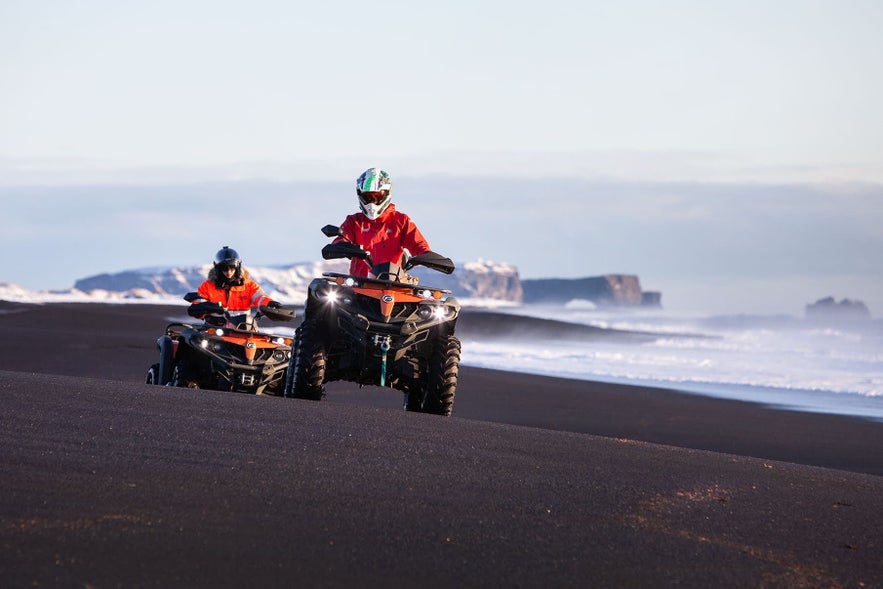 Photo from Thrilling 2 Hour ATV Ride on South Coast to the DC Plane Wreck with Transfer from Myrdalsjokull
Photo from Thrilling 2 Hour ATV Ride on South Coast to the DC Plane Wreck with Transfer from Myrdalsjokull
ATV/Buggy Rides are yet another means of exploring the Icelandic countryside, presenting a burst of adrenaline balanced with some beautiful natural surroundings. This is also the only means of driving "Off-Road" in Iceland, as you will be taking designated trails that do not harm the fragile Icelandic ecosystem.
ATVs seat the rider in a forward-leaning position, from where they control the throttle and brakes from the vehicle's handlebars. Alternatively, a buggy seats the rider in a sitting position and utilizes a steering wheel and pedals. Both vehicles are quite capable of reaching speeds exceeding 50 miles per hour.
- See also: ATVs & Buggies in Iceland
Since you're in charge, it's up to you how fast you go, meaning this type of activity suits all levels. Just make sure to bring with you some warm underlayers and a full international's drivers license. Those who do not have a license can still ride as a passenger.
Mountain biking in Iceland
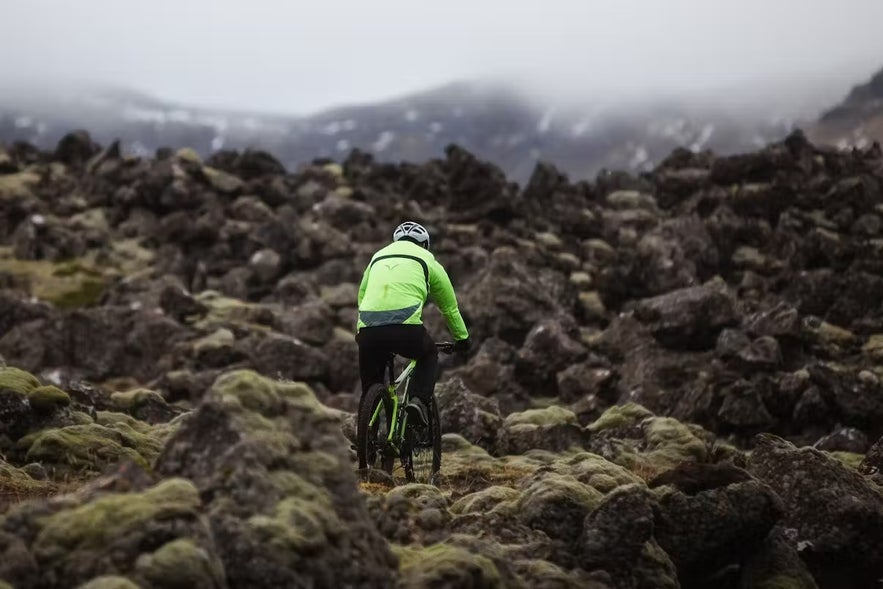 Photo from Exciting 2-3 hour Small-Group E-Mountain Bike Ride on the Snaefellsnes Peninsula
Photo from Exciting 2-3 hour Small-Group E-Mountain Bike Ride on the Snaefellsnes Peninsula
Everyone loves a cyclist. Pedaling away on their two-wheelers, this interesting breed of sportsman has long found Iceland to be particularly suited to cycling. The roads are long, scenic, and hold little traffic, and most of the major attractions can be accessed from the island’s Ring Road.
This has allowed cyclists to merge their passion with traditional sightseeing, extending the process over a number of days in order to allow passage from one destination to the next.
If you want something more demanding, then pick a route, bring your bike over in the summertime, and remember to pack warm clothes, food, and camping gear.
Hiking and Trekking in Iceland
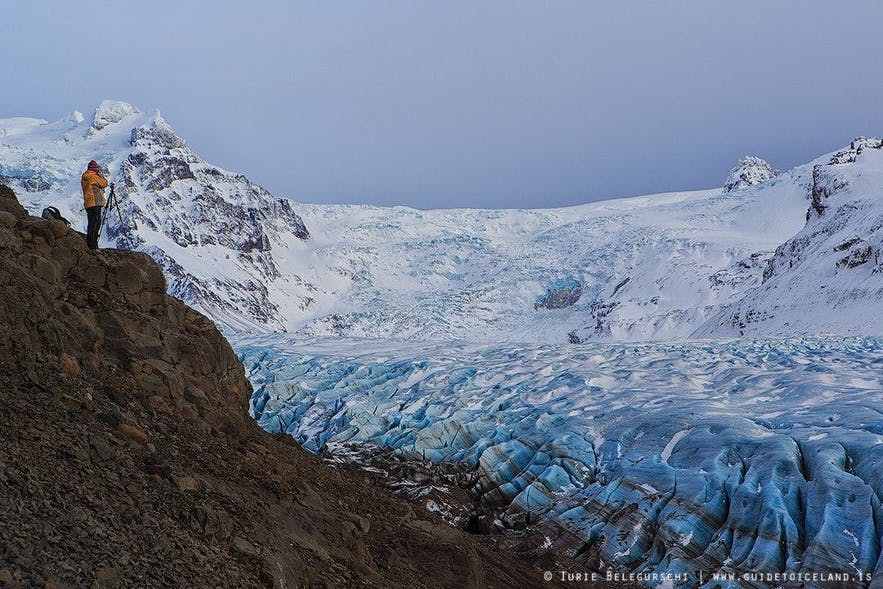
Hiking may not sound like a very extreme sport at first, but when you consider that people can go hiking for a number of days carrying all their food, tent, sleeping bags, and extra clothes over glaciers, deserts, and volcanoes, then you may decide to include hiking within the arena of extreme sports.
- See also: Hiking in Iceland
It is extremely popular to go hiking in Iceland thanks to its eclectic yet ever-stunning landscape. It's a real pleasure to trek in the country, and there are plenty of hiking trails to choose from, including those found in the Icelandic Highlands, particularly in the region of Landmannalaugar ("The Pools of the People").
The most popular route is called Laugavegurinn, between Landmannalaugar and Thorsmork Valley (in total, measuring 34 miles/55 km long). You can also choose to go on shorter, guided hikes around the country.
Horse Back Riding in Iceland
Horseback riding is very popular in Iceland, with the Icelandic horses being world-known for being sturdy, friendly, and having 5 unique gaits, including the 'tölt'. The stout, muscular bodies of the breed withstand the harsh Icelandic elements throughout the year, which is the result of generation upon generation of concentrated breeding.
Icelandic horses, whilst indeed regarded as horses are, in fact, almost pony-sized, meaning they are the perfect fit for younger riders and beginners. This famous horse breed is renowned for its intelligence and curiosity and is very used to people, meaning you're in safe hands (or hoofs) throughout the duration of the tour.
You can choose from a large number of horseback riding tours that last from just a couple of hours for beginners up to multiple days. This also means, thankfully, that horse riding tours are available across the country.
Volcano Tours in Iceland
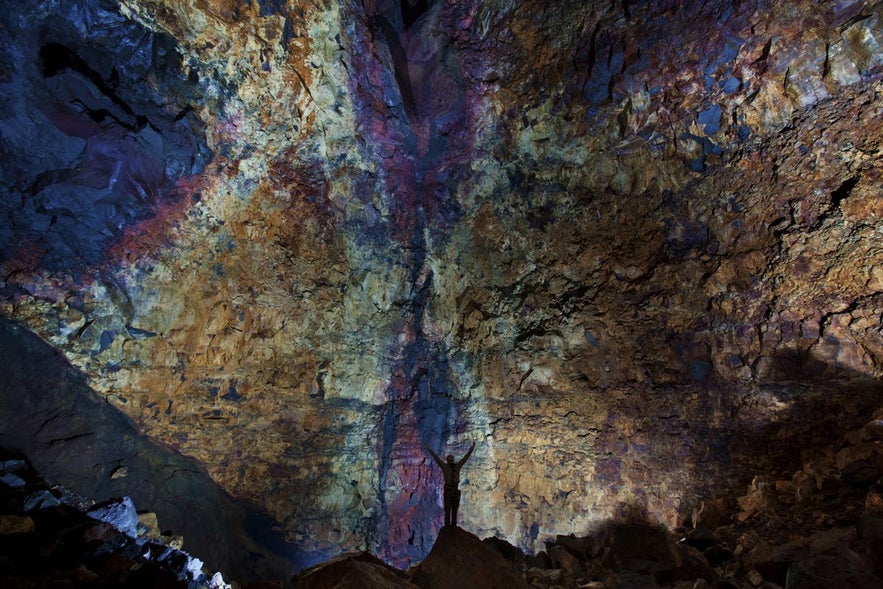
Although infinitely more exciting when they are erupting, this tour inside a volcano is still a pretty impressive caving tour available in the summertime. Fear not; you won't see any flowing magma, but instead, a dazzling caldera made up of colorful inner rock faces.
Volcano tours provide a fascinating insight into the geothermally active nature of Iceland's landscape, as well as presenting one of the more unique activities on earth—actually being inside a volcano!
- See more: Volcanoes in Iceland
- Also, discover the Top 7 Volcanic Experiences in Iceland
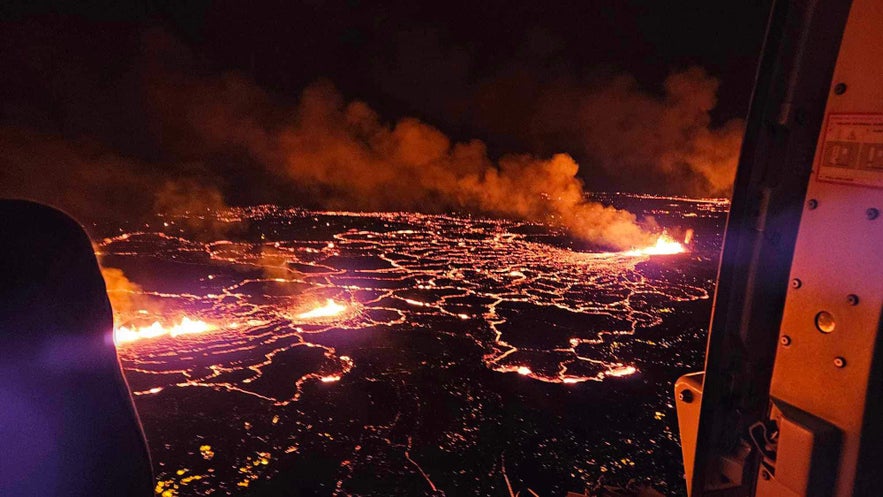 Since 2021, multiple volcanic eruptions have occurred close to Grindavik and on the Reykjanes peninsula. Most of them have occurred in the Sundhnukagigar crater row, which first erupted in December 2023.
Since 2021, multiple volcanic eruptions have occurred close to Grindavik and on the Reykjanes peninsula. Most of them have occurred in the Sundhnukagigar crater row, which first erupted in December 2023.
The previous eruptions at Mt. Litli-Hrutur in July 2023 and Fagradalsfjall volcano in 2022 and 2021 had been tourist-friendly spectacles. During those previous eruptions, hiking paths were established to see both Litli-Hrutur and the Fagradalsfjall craters and lava fields. With the proximity of Sundhnukagigar to the town of Grindavik and the ongoing seismic activity, this has not been possible for the newest eruptions. The whole area is closed off for safety.
Currently, the only way to see the aftermath of the Reykjanes eruptions and the Sundhnukagigar eruption site is with this thrilling volcano helicopter tour, where you'll get an unforgettable aerial view of the area's different eruption sites.
Authorities regularly estimate the safety of the area and if it will be possible to open it up for hikers, so make sure to check the SafeTravel website for updates. If the area is open, you'll likely be able to do the hike by yourself, but it's highly recommended to take a guided volcano tour.
Thrilling Activities in the Air Above Iceland
Heli-skiing and Heli-snowboarding in Iceland
Heli-skiing and Heli-snowboarding are two of the ultimate extreme sports you can experience in Iceland. They are also one of the priciest, unfortunately, but then again, whenever did something so spectacular come cheap?
Heli-skiing and Heli-snowboarding are, quite obviously, more extreme than their usual counterpart, meaning that a higher level of experience and skill is required in order to participate in this type of tour. For those who fit the description, you will have the rare opportunity to ski/snowboard from the summit of a mountain all the way down to the coastlines of the Atlantic.
Nothing beats the feeling of skiing or snowboarding down a steep hill with fresh powder. Such an experience is only complimented by being the only one on the slope. Not to mention when you have breathtaking views all the way down and get to fly around in a helicopter on your way up.
Helicopter Rides in Iceland
Of course, one can also participate in helicopter tours without the need to add skiing or snowboarding to it. Helicopter tours provide one of the most exciting, rewarding, and easiest methods of sightseeing some of the country's major attractions, as well as presenting the chance to look down on a range of dramatic landscapes below.
Helicopter tours will normally depart from Reykjavik Domestic Airport, traveling to a range of destinations, including mountains in the Reykjanes peninsula, the beautiful South Coast, and even the central Highlands.
Paragliding & Skydiving in Iceland
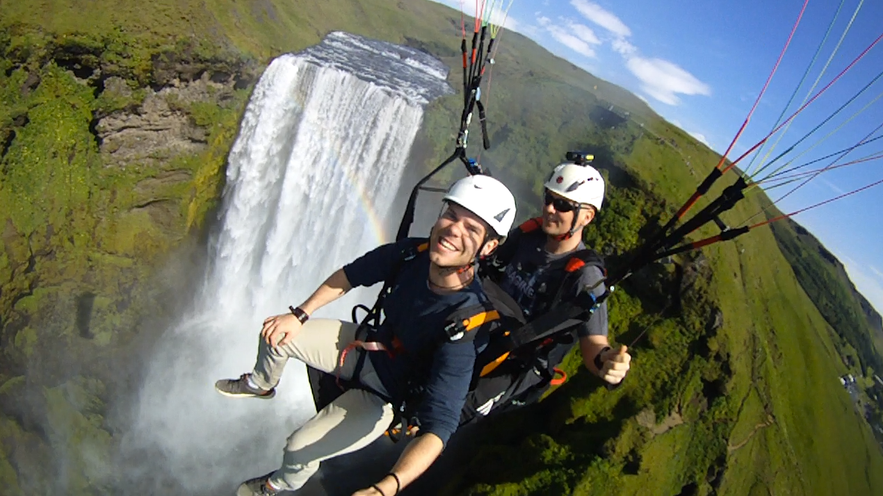
Paragliding is a great way to enjoy the scenic view of Iceland, whilst feeling the freedom of a bird at the same time.
Tandem paragliding tours are operated in the south of Iceland from April to October.
Skydiving is also possible in summertime in Iceland, both tandem jumps and AFF courses, and if you are a licensed jumper already, it's fairly cheap to purchase a jump here.
Did you enjoy our article on the Top Activities in Iceland for Adrenaline Junkies? What activities did you participate in, and what will you be doing next time you're in Iceland? Please leave your thoughts and questions in the comments below!
Andre interessante artikler

Island om sommeren - Den ultimate reiseguiden
Sommeren er en flott tid for å oppdage Island og dets underverker uten begrensninger. Utnytt de mange timene med dagslys til å utforske det vakre landskapet på det islandske høylandet, hilse på det is...Read more
Dette bør du ha på deg på Island: Den ultimate guiden for alle sesonger
Island er beryktet for sitt skiftende vær, med milde vintre og ofte kjølige og vindfulle somre. Det kan virke skremmende å pakke til et land med værguder som er utsatt for humørsvingninger, men du tre...Read moreDe 10 beste turene på Island: Populære og unike utflukter
Oppdag de 10 beste turene på Island, som dekker alt fra fredelig natur til spennende opplevelser. Lær om landets mest populære attraksjoner og de mest fantastiske turene og utfluktene du kan gjøre...Read more

Download Iceland’s biggest travel marketplace to your phone to manage your entire trip in one place
Scan this QR code with your phone camera and press the link that appears to add Iceland’s biggest travel marketplace into your pocket. Enter your phone number or email address to receive an SMS or email with the download link.

